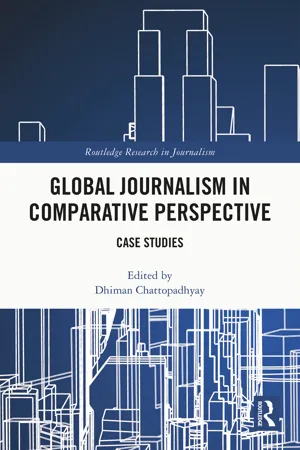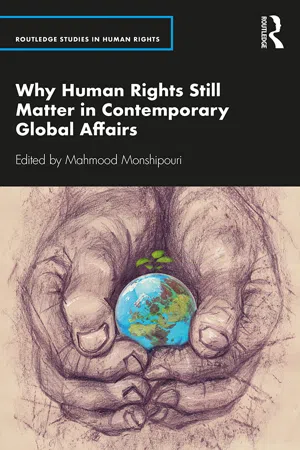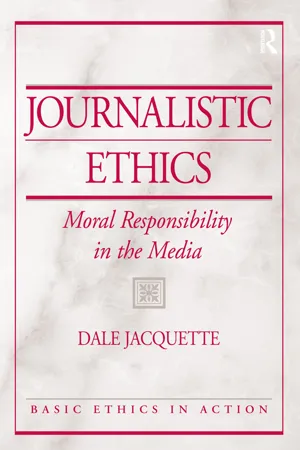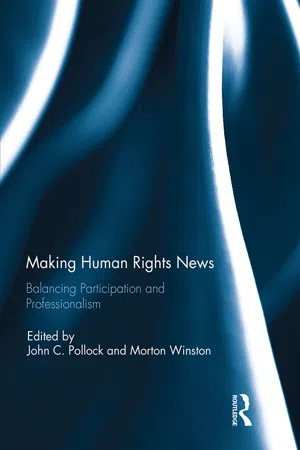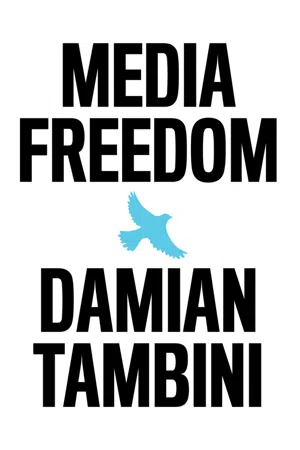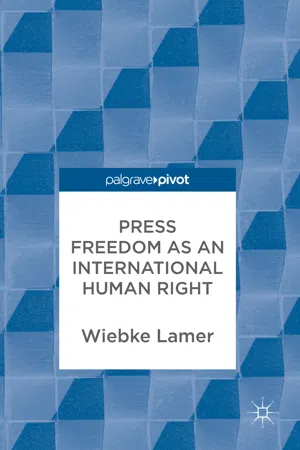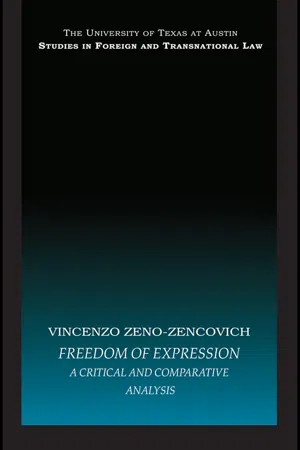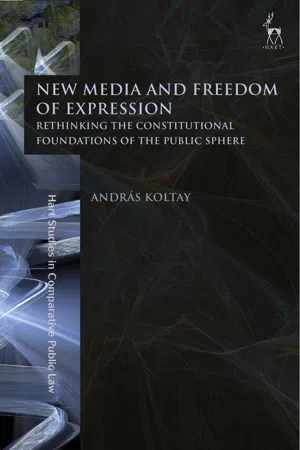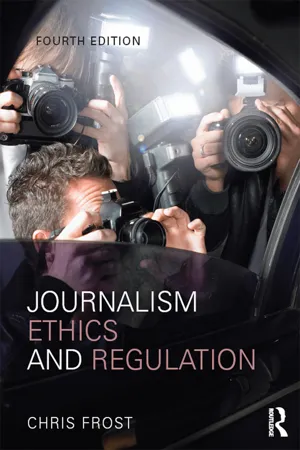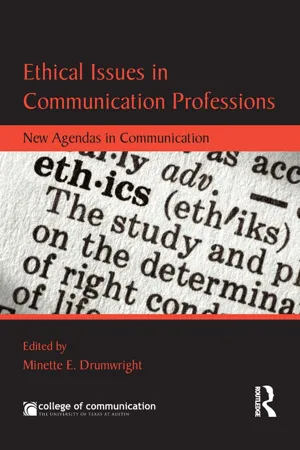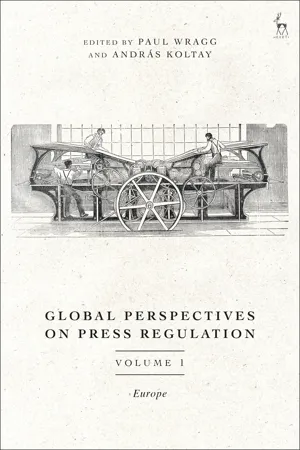Politics & International Relations
Freedom of the Press
Freedom of the press refers to the right of journalists and media organizations to publish and disseminate information without censorship or interference from the government or other authorities. It is a fundamental component of democratic societies, allowing for the free flow of information and the ability to hold those in power accountable. This freedom is often enshrined in constitutions and legal frameworks.
Written by Perlego with AI-assistance
Related key terms
Related key terms
1 of 4
Related key terms
1 of 3
11 Key excerpts on "Freedom of the Press"
- eBook - ePub
Global Journalism in Comparative Perspective
Case Studies
- Dhiman Chattopadhyay(Author)
- 2024(Publication Date)
- Routledge(Publisher)
media freedom in hopes of unifying scholars in shared terminology and conceptualization:- Media freedom refers to the openness of television, newspapers, news magazines, radio, and the internet. Media freedom exists along three dimensions, political, legal, and economic, and is defined both in terms of negative and positive rights. Media is considered free when there is a relative absence of government and economic restraints that inhibit free flows of information—both of individuals and collective entities—and the presence of conditions necessary to ensure the dissemination of a diversity of ideas. The conditions necessary include affordable access to media for citizens, low barriers of entry for contributors, and constitutional provisions and laws to protect citizens, journalists, and media entities, as well as a reliable enforcement mechanism.
This definition should be characterized as relative or qualified, acknowledging that no society has ever had—nor will ever have—a media system that operates completely unfettered, and some regulations are necessary for the operation of a well-functioning society (Ojo, 2003 ; Chafee, 1941 ).How does a free press emerge?
Armed with this definition, we can identify the factors that give rise to a free media environment. The freedoms of the press have always been contentious, and scholars have long wrestled with how to establish parameters of media independence from external interferences, particularly government censorship, while maintaining public order (Milton, 1644 ). The most minimalist interpretations sought to prohibit prior restraint, but without safeguards to protect journalists post-publication, other threats to press freedom emerged, like government retaliation, including harassment, violence, and undue imprisonment (Chafee, 1941 ). Siebert, Peterson, and Schramm (1956) classified presses that suffer from these threats as “authoritarian,” wherein the government attempts to restrict media that may derail its agenda. This type of political control is apparent today in heavily censored countries like Cuba, Eritrea, Myanmar, and Saudi Arabia. Other government threats seek to co-opt the media to achieve the state’s political goals, serving as a propaganda arm of government, as is the case in China and Russia (Freedom House, 2022 - Mahmood Monshipouri, Mahmood Monshipouri(Authors)
- 2020(Publication Date)
- Routledge(Publisher)
Its new status was most notably underlined in the Charter of Fundamental Rights of the European Union. Its Article 11, titled “Freedom of expression and information,” stipulates: (1) Everyone has the right to freedom of expression. This right shall include freedom to hold opinions and to receive and impart information and ideas without interference by public authority and regardless of frontiers; and (2) The freedom and pluralism of the media shall be respected. 14 Thus, in international affairs, freedom of the media (or Freedom of the Press) became a human right of its own, on a par with freedom of expression. This status of Freedom of the Press vis-à-vis freedom of expression was confirmed by media scholars. Some noted that “freedom of the media” is in fact an alternative term to “freedom of expression.” 15 In other words, “press freedom is … the most visible manifestation of the functioning of the general right to freedom of expression, irrespective of media platform.” 16 This right vis-à-vis obligation of the state might mean that: (1) the government should not violate this right (by, say, introducing censorship); (2) the government should not allow third parties violate this right (by, say, introducing limitations on media ownership or must-carry rules); and (3) the government should have positive obligations to develop freedom of the media (by, say, establishing public service media or lowering taxation for the press). Apparently, freedom of the media enjoys stronger protection than freedom of expression, otherwise it would be considered redundant. Media freedom is a special form of freedom of expression. 17 Special protection comes through wider degree of tolerance to the speech in the media than private speech- eBook - ePub
Journalistic Ethics
Moral Responsibility in the Media
- Dale Jacquette(Author)
- 2016(Publication Date)
- Routledge(Publisher)
Similarly, if we want to discover whether a certain politician is taking a bribe, or the facts of trade, or the industrial output of a neighboring state, we require information that can only be obtained by free and open inquiry. There needs to be public disclosure of all potentially useful socially relevant information that is uninhibited by political or religious institutions to whatever degree possible. What is thought to be learned in journalistic investigation must then be further checked by the sort of back-and-forth dialogue that occurs between the presentation, criticism, and refinement of ideas that we find alike in modern science and investigative news reporting. That these concepts still seem to hold good after several hundred years testifies to the extent to which Enlightenment concepts continue to exert their positive influence on our thinking to the present time. The great figures of the Enlightenment understood these principles, and part of their legacy is the fact that even today we appreciate the importance of free scientific inquiry. It follows logically that maximal Freedom of the Press is presupposed by the fundamental principle of journalistic ethics according to which journalists have both the moral right and obligation to provide relevant truth telling in the public interest.All this is just another way of saying that a free society requires and depends essentially on a free press. The two ideals go together inextricably. The relationship between a free society and a free press is organic and deeply interconnected, a mutual reliance in which one supports and draws strength from the other. The freedom of a free press can only be sustained by a society that is in other respects free, and a society can remain truly free only to the extent that it upholds the institutions of a free press. We have yet to learn exactly what it means to speak of a free press, but we can already see in rough outline that there is a symbiotic connection, an essential interdependence, between a free society and a free press. If the free society is going to function, it needs truth—true, correct, accurate information—about unlimitedly and unpredeterminedly many different kinds of things, whose relevance cannot be known in advance or controlled in its direction or outcome if truth is the goal. The only way in turn for a free society to obtain the information it needs for informed self-government is by means of a free press.4FREEDOM OF THE PRESS AS THE FOURTH ESTATE OF A LIBERAL DEMOCRACY
In a rational series of steps, we can project a plausible reason why the authors of the American Constitution next added in the third item of the First Amendment in the Bill of Rights, guaranteeing the right of peaceable assembly and petitioning the government for redress of grievances. For it is only if Freedom of the Press is protected that the citizens of a free society can be relevantly informed about the condition of local and global events, including the state of the union. It is only if citizens have free access to such vital information in turn that they can make informed decisions to meet for purposes of airing objections and organizing themselves for political action. - eBook - ePub
Making Human Rights News
Balancing Participation and Professionalism
- John Pollock, Morton Winston(Authors)
- 2018(Publication Date)
- Routledge(Publisher)
By trying to protect any and all media, the unique functions of the press outlined above are diluted and downplayed. Most movies do not serve a political oversight purpose. Nor do dance competition shows on television or food blogs, for instance. The key is to differentiate between the all-encompassing media and the press that is engaged in newsgathering activities, that provides government oversight, and that facilitates the democratic dialogue. This is not to say that food bloggers and screenwriters have no right to freedom of speech. Of course they do. But their rights are guaranteed by the right to freedom of expression, whereas the special political functions of the press are rarely recognized within the human rights debate and even more rarely legally protected.Others have argued that it is possible to determine who and what constitute being part of the press and thus deserve protection that goes beyond the general free speech rights (West 2011). Arguing that it is difficult to define the press should not be an excuse for not treating it as the important right that it is.Furthermore, if press freedom is recognized as a distinct human right, the fact that media systems differ dramatically from one country to the next, even within the West, will not pose any more obstacles to addressing press freedom more uniformly at the international level. In this case, it will not matter if the press in Britain and France developed differently, or whether one system is market oriented in one country and government subsidized in another. As long as the press is recognized for playing these important structural roles and protected for it, other differences will become less of an obstacle in framing press freedom as a human right.Another reason that is often brought up in negative reference to the media is its status as an economic actor. At the international level global media corporations are often seen within the debate of Western cultural and economic dominance and exploitation of other countries. While this is an important debate, the narrow focus on the media’s economic status and the resulting drawbacks often lead to the political and social functions of the press being overlooked. - eBook - ePub
- Damian Tambini(Author)
- 2021(Publication Date)
- Polity(Publisher)
Article 19 of the UDHR 1948 states that ‘Everyone has the right to freedom of opinion and expression; this right includes freedom to hold opinions without interference and to seek, receive and impart information and ideas through any media and regardless of frontiers.’ But this was not interpreted in the same way in every member state of the UN, or even every Western democracy. In order to understand press freedom in the post-war period, it is necessary to understand how this new structure of international law and institutional encouragement operates, and how this separates the US from the rest of the world.In northern Europe, press freedom was relative and conditional. Moreover, complex systems of tax breaks and subsidy evolved.70 There was widespread monopolization because of economies of scale during the inter-war period, and reflections on the role of concentrated press power in the rise of dictatorship led to profound soul-searching and the beginning of a new global movement for qualified press freedom.Alongside these deep changes in media ethics and journalism, Freedom of the Press was taken up, redefined and transformed in the international discourse of human rights. This marked a major breakthrough for the press, as it enabled press and speech rights to be asserted against governments, in an international forum, according to international standards. The global human rights system emerged in the decades following the war and was built around a series of international treaties: the UDHR, the ICCPR.71 The Universal Declaration on Human Rights set the framework for an evolving set of international standards under Article 19 UDHR (which gave rise to Article 19 of the ICCPR, which is the UN’s general free speech agreement). Regional treaties such as the European Declaration on Human Rights developed their own case law and doctrines of media freedom.In a cold war context dominated by the USA, a confident, liberal democratic hegemon, press and speech freedoms were asserted as a means to counter authoritarianism. The US approach to the positive protective standards applicable to the rest of the world, with scope for interventions to promote equality of voice and a developed theory of the role of the free media in democracy, contrasted with its own domestic law approach to media freedom. Indeed, the US tended to enter reservations to international provisions like Article 19 ICCRP, claiming that its own standards were higher. - eBook - ePub
- Wiebke Lamer(Author)
- 2018(Publication Date)
- Palgrave Pivot(Publisher)
The following draft by Cassin again included the press: “There shall be freedom of expression by word of mouth, in writing, in the Press […]” (Glendon 2001, 277). However, it did not grant Freedom of the Press like the First Amendment did, because the emphasis was still on freedom of expression. It also emphasized the restrictions on freedom of expression, and the free press in particular, by saying “that the author, and the publishers, printers and others concerned shall be answerable for any abuse of this right by defamation of character or failure to present information and news in a true and impartial manner” (Glendon 2001, 277). Although the article on freedom of expression was subject to heated deliberations in the Sub-Commission on Freedom of Information and of the Press, there does not seem to be any evidence that the specific inclusion of references to the press was considered controversial. This suggests that the delegates considered press freedom as part and parcel of the freedom of information concept. Indeed, the US-backed Philippine draft resolution from December 1946 that called for the convention of an international conference on freedom of information notes that “[f]reedom of information implies the right to gather, transmit and publish news anywhere without fetters” (UN General Assembly 1946). US delegate Chafee advocated passionately for the inclusion of a free press clause in the International Bill of Rights: It raises the banner of Freedom of the Press, where all citizens can see and respect it. Constitutional recognition prevents freedom of speech from remaining an ideal of radicals or of isolated thinkers like Milton and Mill, or of any other special group such as professors and newspaper owners. These men would probably cherish the ideal, without the first amendment, but that ideal would then lack a large portion of emotional force which it now possesses - eBook - ePub
Freedom of Expression
A critical and comparative analysis
- Vincenzo Zeno-Zencovich(Author)
- 2008(Publication Date)
- Routledge-Cavendish(Publisher)
36 If they do not fulfil the function, there is no reason to apply the regime. The situation is especially clear in the television sector, where the distinction is made among the various formats between information and entertainment programmes. It is part of the Freedom of the Press to be able to choose between them, but there is no logical justification in arguing that variety shows or game shows offering prizes should benefit from a regime that owes its privileges to considerations of freedom of expression. This does not exclude the eventuality that within these formats there might be issues of protection of individual expression. Thus it is the aim of the activity that is important, a consideration that does not apply in the case of individual expression, which requires no teleological justification for protection.Freedom of the Press thus appears to be predicated on its contribution to the expression of ideas and its role in informational activity. From this various demands arise: that barriers to access be removed, both for businesses and for individuals; right of access to the sources of information; provisions for professional secrecy; immunity for informational activity carried out with due diligence; facilitation of, rather than obstacles to, distribution.At the same time, and just as with any other business, freedoms are accompanied by responsibilities, expressed as the common norms of professional diligence, a counterweight to the unrestrained pursuit of profit.37Moreover, it should not be overlooked that a fault-based system of liability (that is to say, one based on a failure of professional diligence) represents preferential treatment vis-à-vis the rest of the commercial world, which is subject to a strict liability regime.1.6. The press as power
Since the first decades of the nineteenth century the press, understood as the communications media generally, has been viewed as a ‘power’.38This observation is clearly accurate, insofar as one socio-economic group is in a position to influence not only decisions but indeed who is to take them.There is nothing intrinsically odd about this, especially in a democratic system where various groups, political parties, trade unions, business associations, religious groups, consumers, voluntary associations and popular pressure groups, all compete in the process of choosing representatives to sit in parliament and form a government and directing their choices.What is anomalous, however, is that the exercise by the press of this power is – either in theory or according to claims to such effect – based on freedom of expression.39 - eBook - ePub
New Media and Freedom of Expression
Rethinking the Constitutional Foundations of the Public Sphere
- András Koltay(Author)
- 2019(Publication Date)
- Hart Publishing(Publisher)
237 Brennan, similarly to Stewart, underlines that the interests of the society as the foundation of Freedom of the Press is the most important difference compared to the freedom of speech.Sonja West argues for the ‘distinctness’ of journalism – and so the media – as an institution.238 She is of the opinion that the Freedom of the Press should not be restricted to the right of publication and distribution, and that it not only serves to protect the free use of certain technologies, but also has a democratic function.239 According to West, if we grant the protection of the Freedom of the Press to everyone who exercises their freedom of speech, and to the same extent, this paradoxically would result in the devaluation of the Freedom of the Press, since this approach would fail to take into consideration the unique social role of the media.240 The media and the journalists working in it not only publish diverse opinions but first and foremost also act as the main driver, engine and forum of the public sphere. The media cannot be put on the same footing as a group of individuals exercising their right to freedom of speech through loudspeakers, not even if today, thanks to the new technologies, anyone can collect and even publish news.241Unlike in the US practice, European constitutions and the individual legal systems actively try to separate the freedom of speech from the Freedom of the Press. The media is separately regulated by all European states, and the EU has even created separate legislation for audiovisual media services.242 The distinction between the two rights is also reflected in the English legal literature.243 A recent article by Thomas Gibbons highlights that the freedom of speech is the right of individuals and not of institutions (media enterprises), while the owners’ rights attached to the media are not unconditional and are not the same as those of freedom of speech.244 At the same time, the recognition of the media as an ‘institution’ is important, since if it is strong enough, it can resist external pressure. With that said, it can also be subject to restrictions for the benefit of the community.245 - eBook - ePub
- Chris Frost(Author)
- 2015(Publication Date)
- Routledge(Publisher)
Other rights granted under the appropriate convention also need to be considered when measuring whether one should fully press freedom of expression. People’s right to privacy, liberty, security, fair trial and presumption of innocence could all be adversely affected by my using my right to freedom of expression and opinion. This is why the freedom of the media is not directly the same as the freedom of the individual. My right to freedom of expression when I am there to answer directly for my views can be entirely open and only if I can be shown to have acted with malice, or have recklessly set out to deceive or blacken someone’s name without regard for the consequences of my actions should there be legal repercussions. But when I express opinions that potentially cause serious harm and can be heard or read by millions, without my being there to take the blame, when my views can reach a wide audience instantly, other safeguards are felt to be required by society. I must handle such power far more responsibly, and society should have the power to be able to insist that I can defend my decision to publish what I have to that wider audience. But otherwise, the free press is an extension of freedom of speech.There are four main areas of a journalist’s work in which professional morality may place a limit on freedom to publish or broadcast. They are:- The limits that are placed on what information is gathered.
- The limits that are placed on how that information is gathered.
- The limits that are placed on what information is published.
- Guaranteeing the quality of the information that is published.
Limiting what information journalists can gather
It is confusing and concerning that many people in Britain, and indeed in several other countries, appear to support freedom of speech and a free press while supporting censorship on specific matters. In a Times/Mirror Center (now the Pew Center) for the People and the Press survey taken in 1994 a worryingly low 52 per cent of Britons said they supported a free press (the lowest of all the countries surveyed). Yet 71 per cent of respondents in Britain favoured censorship to discourage terrorism, a similarly high figure to those who would welcome censorship to restrict portrayals of explicit sex (72 per cent). Many might say this is because of the high levels of terrorism in this country, yet both Spain and Italy, which face similar problems, had much lower numbers of respondents calling for censorship (62 per cent and 42 per cent respectively) (see Table 3.1 ).The 1987–95 British broadcast ban, which prevented the broadcast of the voices of certain politicians, particularly those from Sinn Fein, the political wing of the Irish Republican Army (IRA), was a relatively thin edge of an extremely dangerous wedge. Although there were many who believed that removing the ‘oxygen of publicity’ would stifle the IRA and therefore reduce the violence, there is no evidence that this was the case; indeed it defies logic. Violence is often the last resort of those who are otherwise unheard. Censoring the views and opinions of those who believe they have legitimate grievances or complaints is an almost guaranteed way of ensuring that they start using more direct and often violent methods. The present upsurge of Islamist terrorism and protest around the world is an argument for listening more closely, not for restricting freedom of the media. Accepting the principle that there are certain people in society who do not have the right to speak or be heard purely on the basis of who they are is essentially no different to gagging anyone whose opinions are not welcome by the ruling group. Not acknowledging this is to live in ignorance of, or indifference to, the evidence presented by scores of tyrannical governments around the world who have imprisoned journalists, political opponents and others who have voiced opinions that were not welcome. Society should not be preventing coverage of Muslim extremists or the BNP in the news media for fear of what they might have to say for only the oxygen of publicity will expose them for what they are, not a conspiracy of silence and censorship. By debating, challenging and presenting counter-arguments society can work through the problems, isolating those whose extremism is purely opportunistic and protecting and assisting those with real grievances. - eBook - ePub
Ethical Issues in Communication Professions
New Agendas in Communication
- Minette Drumwright(Author)
- 2013(Publication Date)
- Routledge(Publisher)
The idealistic, utilitarian vision of journalism as a constitutionally protected and imperative institution that Justice Stewart presented in 1974 is one normative model of modern free-press theory. But the theory is outdated when one considers the transformative effects of the Internet on journalism. The status and role of journalism has changed dramatically in recent years, with potentially transformative effects on free-press theory. For free-press and journalism-ethics scholars, a profound question is whether the Stewart-Blasi-Anderson view of journalism as a special discourse—constitutionally protected and democratically important—is even worth rescuing in the Internet age. As Professor Randall D. Eliason has argued, laws specifically protecting journalism “may soon be considered a relic of a simpler era—a relic that now is neither workable or necessary” given the “rapid technological changes in both the nature and quantity of information regularly made available to the public” (Eliason, 2006).This argument can be troubling to free-press and journalism-ethics scholars because it challenges theoretical frameworks and modern legal and ethical doctrines. Free-press theory as it has developed in American legal jurisprudence has emphasized normative claims about the role of journalism in a democratic society to justify special rights and responsibilities. Broadly speaking, the principle of Freedom of the Press forbids the government from censoring, punishing, or licensing the press except in extraordinary circumstances and under strict scrutiny of the judiciary, based on the justification that a free press is necessary for citizens to exercise their sovereignty over government. Indeed, one cannot read the U.S. Supreme Court's major press cases of the twentieth century without appreciating the Court's full embrace of the essential tenets of the free-press principle. This began in 1931 when, in Near v. Minnesota , the Court struck down a Minnesota law that allowed newspapers to be banned as a public nuisance. Five years later, in striking down a Louisiana law requiring the nine largest newspapers in the state to pay a 2% licensing tax, the Supreme Court wrote in Grosjean v. American Press Co. (1936), “A free press stands as one of the great interpreters between the government and the people. To allow it to be fettered is to fetter ourselves” (p. 250). The Supreme Court expanded its commitment to the free-press principle in ensuing decades. In the landmark 1964 decision New York Times v. Sullivan , in which the Court overturned a $500,000 libel judgment against the New York Times - eBook - ePub
- Paul Wragg, András Koltay, Paul Wragg, András Koltay(Authors)
- 2023(Publication Date)
- Hart Publishing(Publisher)
3 Freedom of the Press in France GUILHEM GIL1.Introduction‘Press freedom only wears out if it is not used’. This motto, printed on every issue of the satirical newspaper Le Canard enchaîné since its founding in 1915, conveys the fundamental idea that recognising press freedom as a legal principle is not enough. Its social and political value depends on the way it is used, which raises the question of whether the law should provide a legal framework for the exercise of this freedom. French domestic law has twice answered this question in the affirmative, in two of its founding instruments.The first of these documents is the Declaration of Human and Civic Rights of 26 August 1789 which embodies the Rousseauist idea that statutes are the ultimate means of expressing the will of the people. It follows from this that if Article 11 of the Declaration explicitly protects free speech, this protection is granted subject to the general provisions of Article 4 which entrusts the law with the mission of determining the bounds ensuring and limiting the exercise of the natural rights of every man. This view, mainly supported by La Rochefoucauld and Mirabeau, was strongly opposed by other revolutionaries, such as Robespierre, who considered that such a freedom should never be restrained, even by law. These two opposite positions, one favouring a limited freedom while the other supported an absolute liberty, resurfaced when the second main legal pillar was crafted: the 1881 Act on Press Freedom. Once again, some of those involved, such as Clémenceau, argued that the best protection for press freedom lies not in the enactment of a specific statutory instrument but in the lack of it and in the application of ordinary law. This view did not prevail and, while the 1881 Act recognises press freedom as a general principle, it immediately attached to it a long list of limits, prohibitions and threats of sanctions.
Index pages curate the most relevant extracts from our library of academic textbooks. They’ve been created using an in-house natural language model (NLM), each adding context and meaning to key research topics.
Explore more topic indexes
Explore more topic indexes
1 of 6
Explore more topic indexes
1 of 4
